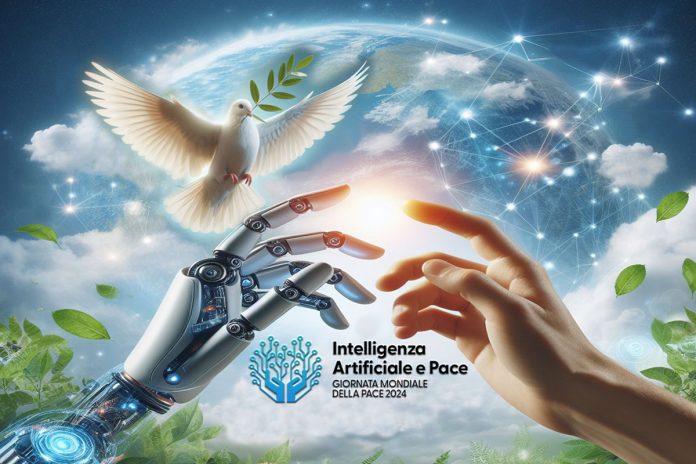Rome (Italy). On 1 January 2024, we celebrate the 57th World Day of Peace, established by Pope Paul VI in 1968, inviting everyone to prayer and reflection on this gift to be asked incessantly, to promote paths oriented towards peace for all humanity.
“At the beginning of the new year, a time of grace that the Lord gives to each one of us, I would like to address the People of God, the nations, the Heads of State and Government, the Representatives of the different religions and civil society, and all the men and women of our time to offer my best wishes for peace.”
This is the beginning of the Message of Pope Francis that emphasizes a theme of great relevance, “Artificial intelligence and peace”. While rejoicing for “the extraordinary achievements of science and technology,” he expresses apprehension about the dangers that they may entail for the common home and speaks of “exciting opportunities and grave risks, with serious implications for the pursuit of justice and harmony among peoples.”
He therefore poses urgent questions: “What will be the medium and long-term consequences of new digital technologies? What impact will they have on the lives of individuals and society, on international stability and peace?”
The Pope stresses the ethical dimension underlying scientific research and technological innovations, linked “to choices conditioned by the personal, social, and cultural values of every age,” which determine the “decisions of those who design experimentation and direct production towards particular objectives.”
However, noting that “it is not enough even to assume, by those who design algorithms and digital technologies, a commitment to act in an ethical and responsible way, he expresses the need to “to strengthen or, where necessary, establish bodies to examine emerging ethical issues and to protect the rights of those who use or are affected by forms of artificial intelligence” and to accompany technological expansion through “adequate formation in responsibility for its development.”
The Holy Father also indicates as “indisputable criteria” at the basis of the development of new technologies and for the prior evaluation of their use the “intrinsic dignity of each person and the fraternity that binds us as members of the one human family. Technological developments that do not lead to an improvement in the quality of life of all humanity, but on the contrary aggravate inequalities and conflicts, can never be considered true progress.”
There are many technical and also anthropological, educational, social, and political challenges that bring with them artificial intelligence, of which today’s world is already pervaded and that will become increasingly important. We must therefore “be aware of the rapid changes taking place and manage them in a way that safeguards fundamental human rights, respecting the institutions and laws that promote integral human development. Artificial intelligence should serve the best human potential and our highest aspirations, not compete with them.”
One of the challenges that Pope Francis particularly highlights is the educational challenge, which questions teachers and educators in their method. “Young people are growing up in cultural environments permeated by technology and this cannot fail to call into question the methods of teaching and formation.” This increasingly requires the ability to promote critical thinking and to accompany young people to develop “an ability to discern the use of data and content collected on the web or produced by artificial intelligence systems. Schools, universities, and scientific societies are called to help students and professionals make their own social and ethical aspects of the development and use of technology.”
These are choices that must be carried out at a personal and community level, as also pointed out by Mother Chiara Cazzuola, Superior General of the FMA Institute, in her message of greetings “Christmas of light and peace” saying, “Peace is an invaluable good and depends, for the most part, on the policies of governments, but it also depends on choices that we can make as people, as communities, as citizens of the world.” She also reaffirms the importance of language, because peace is also built by “disarming our hearts and softening our words.”
“May faithful Christians, believers of various religions, and men and women of good will work together in harmony to seize the opportunities and face the challenges posed by the digital revolution, and deliver to future generations a more united, just, and peaceful world.” This is the hope and the wish with which Pope Francis ends the Message for the World Day of Peace 2024.





















Anno Nuovo
Poesia di Giovanni Minio
Viene l’anno nuovo
ma il nuovo non è mai venuto,
ne tra noi,
ne sulla Terra,
dove c’è sempre stata la guerra.
Così festeggiando questa data,
ci auguriamo come sempre,
una prossima fermata,
dove scendere tra pace, fiori e felicità.
Ma purtroppo il Mondo non cambierà!
Comunque baciamoci
e scambiamoci gli auguri,
perché questa è tradizione
e perché così ci va!
Viva , viva il cambiamento,
anche se non ci sarà!
Comunque questo è un momento,
che sempre ci emozionerà!